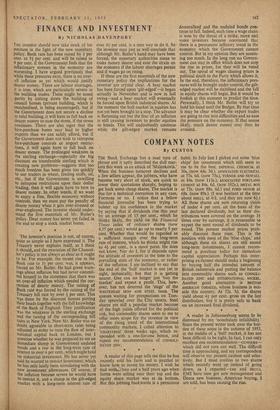FINANCE AND INVESTMENT
By NICHOLAS DAVENPORT
1 RE investor should now take stock of his Position in the light of the new monetary Policy. Bank rate has been raised by + per cent. to 3i per cent. and will be raised to 4 per cent. if the Government feels that the inflationary stresses in the economy are worsening. I have argued previously that while these pressures exist, there is no over- all inflation as yet which would justify dearer money. There are labour shortages, it is true, which are particularly severe in the building trades. These might be eased Partly by cutting down the building of council houses (private building, which is unsubsidised, is being encouraged), but if the Government does not secure a decline in total building, it will have to fall back on dearer money to ease the stress, if the stress continues. There are also signs that the hire-purchase boom may lead to higher imports than we can safely afford, but if the Government does not wish to reimpose hire-purchase controls or import restric- tions, it will again have to fall back on dearer money. The prolonged weakness in the sterling exchange—especially the big discount on transferable sterling which is creating new problems—suggests that too much freedom has been given too quickly to our traders in wheat, feeding stuffs, oil, etc., but if the Government is unwilling to reimpose restrictions upon their dollar trading, then it will again have to turn to dearer money. In other words, if we want to enjoy a free, flexible economy without controls, then we must pay the penalty of dearer money when it gets over-stressed or over-employed. The investor should under- stand the first essentials of Mr. Butler's Policy. Dear money has never yet failed in the end to stop a stock market boom.
over 4+ per cent. is a sure way to do it. So the investor may just as well conclude that although Mr. Butler's hand may have been forced, the monetary authorities mean to make money dearer and ease the strain on the economy if the labour shortages persist and if wages go on rising.
If these are the first essentials of the new monetary policy the implications for the investor are crystal clear. A bear market has been forced upon `gilt-edged'—it began actually in November and is now in full swing—and a bear market will eventually be forced upon British industrial shares. At the moment the bull market in equities has not yet been brought to a stop. The advance is flattening out but the fear of an inflation is still causing investors to prefer equities to bonds. This will undoubtedly continue while the gilt-edged market remains
demoralised and the undated bonds con- tinue to fall. Indeed, each time a wage claim is won by the threat of a strike, more and more investors become convinced that there is a permanent inflatory trend, in the economy which the Government cannot control. But in my opinion they are assum- ing too much. In the long run no Govern- ment can stay in office which does not stop the rise in prices, for they will be voted out. The spiral of wages chasing prices is political death to the Party which allows it. In the end, therefore, the inflationary pres- sures will be brought under control, the gilt- edged market will be stabilised and the fall in equity shares will begin. But it would be foolish at this moment to predict the time. Personally, I think Mr. Butler will try to hold his hand until the Budget. By that time it may be clear whether the export trades are going to run into difficulties and so ease the pressure on the economy. If that seems likely, much dearer money may then be avoided.


































 Previous page
Previous page